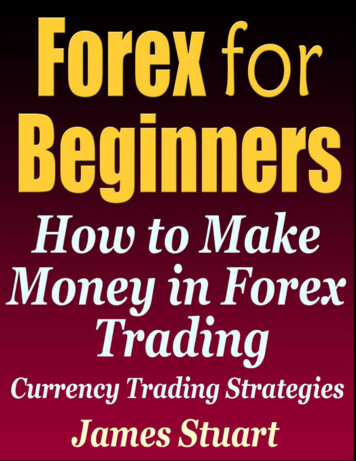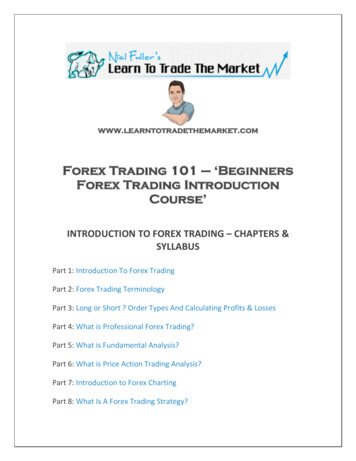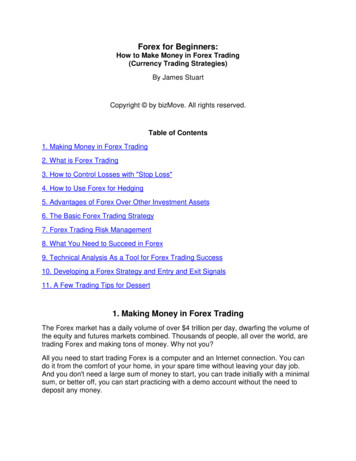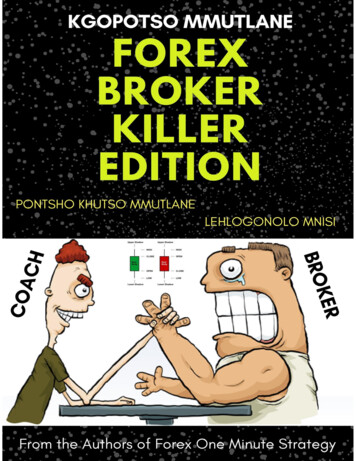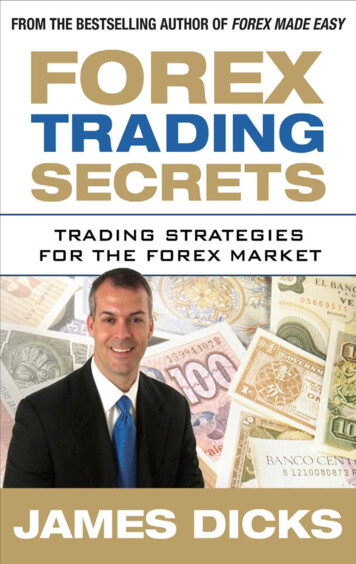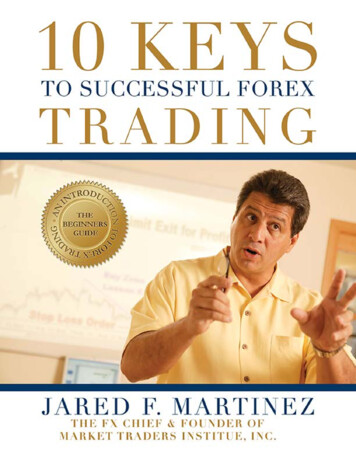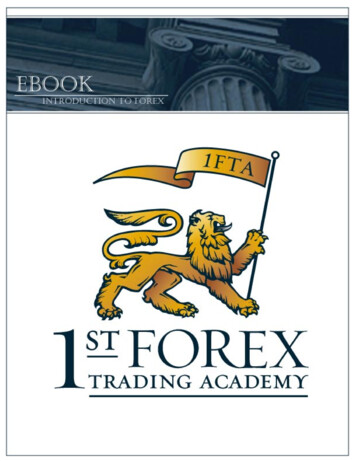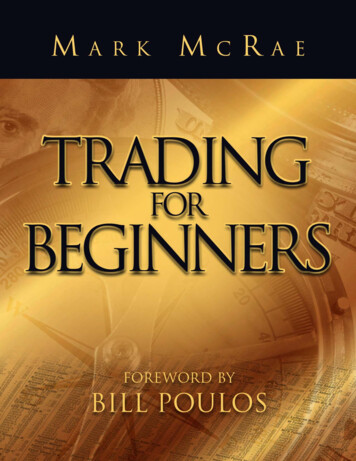
Transcription
TRADING FOR BEGINNERSBy Mark McRaeCopyright Mark McRae and www.tradingforbeginners.com Reproduction or translation of any part of this work by any means, electronic ormechanical, including photocopying, beyond that permitted by the copyright law,without permission of the publisher, is unlawful.
Trading For BeginnersRISK DISCLOSURE STATEMENT / DISCLAIMER AGREEMENTTrading any financial market involves risk. This book and the website www.tradingforbeginners.comand its contents are neither a solicitation nor an offer to Buy/Sell any financial market. The contents ofthis book are for general information purposes only (contents shall also mean the websitewww.tradingforbeginners.com).Although every attempt has been made to assure accuracy, we do not give any express or impliedwarranty as to its accuracy. We do not accept any liability for error or omission. Examples areprovided for illustrative purposes and should not be construed as investment advice or strategy.No representation is being made that any account or trader will or is likely to achieve profits or losessimilar to those discussed in this book. Past performance is not indicative of future results.By purchasing this book, subscribing to our mailing list, or using the website, you will be deemed tohave accepted these terms in full.Mark McRae, the website, this book, and its representatives do not, and can not, give investmentadvice or invite customers to engage in investments through this book.We do our best to insure that the website is available 24 hours per day but we cannot be held liable if,for any reason, the site is not available.The information provided in this book is not intended for distribution to, or use by, any person orentity, in any jurisdiction or country, where such distribution or use would be contrary to law orregulation or which would subject us to any registration requirement within such jurisdiction orcountry.Hypothetical performance results have many inherent limitations, some of which are mentionedbelow. No representation is being made that any account will or is likely to achieve profits or lossessimilar to those shown. In fact, there are frequently sharp differences between hypotheticalperformance results and actual results subsequently achieved by any particular trading program.One of the limitations of hypothetical performance results is that they are generally prepared with thebenefit of hindsight. In addition, hypothetical trading does not involve financial risk and nohypothetical trading record can completely account for the impact of financial risk in actual trading.For example, the ability to withstand losses or to adhere to a particular trading program in spite of thetrading losses are material points, which can also adversely affect trading results. There arenumerous other factors related to the market in general or to the implementation of any specifictrading program which cannot be fully accounted for in the preparation of hypothetical performanceresults and all of which can adversely affect actual trading results.We reserve the right to change these terms and conditions without notice. You can check for updatesto this disclaimer at any time by visiting www.tradingforbeginners.com/disclaimer.htmlThe contents of www.tradingforbeginners.com and this book are copyrighted and may not be copiedor reproduced.3
Trading For BeginnersTable of ContentsRISK DISCLOSURE STATEMENT / DISCLAIMER AGREEMENT.3TESTIMONIALS .6FOREWORD BY BILL POULOS.7INTROCUTION.8WHAT TO EXPECT FROM THIS BOOK .9TRADING – THE REALITY.1090% OF TRADERS GO BUST .10LACK OF TRADING EDUCATION .11COMMON MISCONCEPTIONS OF NEW TRADERS .11FUNDAMENTALS OF TRADING .11THE FLAW IN OUR EMOTIONS .12TRADING IS NOT AN EXACT SCIENCE .13INVESTOR OR SPECULATOR .14INVESTOR .14SPECULATOR .15WHO TRADES THE MARKETS? .16WHAT DO PEOPLE TRADE?.17COMMONLY TRADED SECURITIES .18Stocks.18Futures .23Forex .25Options .29INTRODUCTION TO TECHNICAL ANALYSIS .31RANDOM WALK.31THE DOW JONES THEORY AND OTHER THINGS .33Mr. Charles Dow and Edward Jones .35The Dow Theory .35FUNDAMENTAL VS. TECHNICAL FORECASTING .38FUNDAMENTAL .38TECHNICAL ANALYSIS .39CONCLUSION .39LET’S GET TECHNICAL.40BULL MARKET.40BEAR MARKET .41LAMB MARKET .41VISUAL RECOGNITION .42CANDLESTICKS .44LINE CHART .46POINT & FIGURE CHART .47TIME PERIODS.48THE TREND IS YOUR FRIEND .494
Trading For BeginnersTRENDS .50Up Trend Line .51Down Trend Line.52FAN LINES .55CHANNELS .56SUPPORT AND RESISTANCE .60Moving Averages.64Simple Moving Average.65Which Moving Average to Use .69STOP LOSSES .70EXITING A LOSING TRADE .71BID/OFFER .73PAPER TRADING .75LEVERAGE.78PROBABILITY .80Law of Averages (Independent Trials) .81Dependent events.82TRADING AND PROBABILITY.84Drawdown .86Maximum Drawdown .87Measuring Drawdown Recovery .87Risk Reward Ratio.90THREE DIFFERENT TRADING METHODS .91THE TREND FOLLOWING METHOD.91THE BREAKOUT METHOD .93THE REVERSAL METHOD .95WHAT WILL MAKE OR BREAK YOU? .97IMPORTANT .98GLOSSARY OF TERMS AND COMMONLY USED EXPRESSIONS.99CONTACT INFORMATION .1035
Trading For BeginnersTESTIMONIALS'Trading for Beginners' is a marvelous resource that even a person likeme with no background in trading can understand. It is written in clear,short units, which enable a beginner to trial concepts one at a time untilunderstanding dawns.Its author, Mark, further enhances this understanding by answering anyemail promptly and in such a way that it encourages the learner to askeven the most trivial of questions.I have learnt a great deal in a short time from this process and consideranyone with an interest in trading will benefit from 'Trading ForBeginners'.Patricia BerwickAustraliaHello Mark,Thanks for the time taken to answer my questions, all I can say is this isa great little book.Thanks,Donnie SpannHi Mark,I wish to write to you personally to let you know how I much I appreciateyour wonderful book.Terry DurangoI received the book with joy. Thanks for the time taken to put thisincredible piece together.Thanks,Abraham RashidI just want you to know that, of all the money I've spent on my tradingeducation, you are one of the best deals out there.Thanks a million,Bill Cael6
Trading For BeginnersFOREWORD by Bill PoulosMy compliments go to Mark McRae on his excellent book, “Trading forBeginners”. This introductory trading book is among the finest I have everread. Mark goes well beyond trading basics and gets right to the heart of thematter of what it takes to become a successful trader.Mark separates fact from fiction in a sobering assessment of why most traderslose. This information alone could save those new to trading, and seasonedtraders alike, years of frustration and losses.Once the reader understands the realities of trading, Mark goes on to reviewthe various markets that are commonly traded, fundamental vs. technicalanalysis, including an in-depth review of technical analysis basics which arekey to trading the markets.But that’s not all! Mark finishes up with a great discussion on how to evaluaterisk vs. reward for proper risk management, the all-important subject of traderdiscipline and even discloses three different trading methods.If you’re serious about trading, do yourself a favor and read this book. Ibelieve it will help you dramatically shortcut your learning curve on the way tolearning how to trade with a winning edge.Good Trading,7
Trading For BeginnersINTRODUCTIONCongratulations on your great decision on learning how to trade. This littlebook will probably be the best investment you will ever make in your tradinglife.Regardless of what financial instrument you will eventually trade, the mostimportant thing is learning what to do and what not to do. There are manysharks out there who offer services to the novice trader with the sole intentionof taking their money.In this book you will learn what the best thing to trade for you is, the best wayto trade it, and how to trade it. I will not be promoting any service or institutionso I have no bias towards pointing you in any particular direction.The purpose of this book is to teach you the basics of trading and how tomake an informed decision on the best way to trade. We will cover all thebasics that most people are too afraid to ask for fear of appearing silly. We willget into some advanced stuff later but we will take it one step at a time.Very Important: This book is for educational purposes only. I am notsuggesting or implying anywhere in the book that you should rush out andinvest your hard earned money in the financial markets. In fact, I will teachyou how to trade on paper without risking any of your hard-earned moneyfirst.Never! Never! Never! Put money into anything you don’t fully understand. Thisis where this book comes in. All the basics you need to know are included inthe following chapters.8
Trading For BeginnersWHAT TO EXPECT FROM THIS BOOKAs the name implies, this book is designed for new and novice traders. It hasalso, however, become a reference point for many experienced traders. Theconcepts contained in the pages that follow can just as easily be adapted forthe professional trader as well as the novice trader.My hope is to guide new traders through the labyrinth of complexterminologies and market jargon and bring them out the other side infinitelymore informed and better equipped to trade just about any market.Because I am assuming that you are either new to trading, or are trying tofurther your education in trading, the scope of this book is fairly large and isintended for trading in general, as opposed to a particular market segment.New traders often are unsure of, not only the best market to trade, but arealso unaware of, the variety of markets that can be traded.9
Trading For BeginnersTRADING – THE REALITYThe fact that you have purchased this book indicates that you have eitherdecided that you would like to learn how to trade, or that you have started totrade and are still pursuing a better way to trade.If you are new to trading then I am glad you started with this book becausethere are a lot of misconceptions out there.The first question I would like you to ask yourself is why you decided that youwanted to trade in the first place? The dream of working at home and earning loads of money? The thought that you could beat the markets? The images of what you have seen on T.V and the excitement oftrading?I ask these questions because, for the vast majority of professional traders,life is nothing like what it is perceived to be.The early stages of your trading career can be frustrating, soul destroying,and financially unrewarding.90% of Traders Go BustBelieve me when I tell you that 90% is a conservative estimate. Some sourceshave it as high as 99% of traders losing their initial starting capital. I have alsoread that not only do over 90% of them lose their money, but 10% actually gobankrupt.Why is it that so many traders fail? It is not because they are stupid. In fact,statistics show that the majority of traders are well educated, have aboveaverage incomes, and are generally highly motivated.So why do so many fail?10
Trading For BeginnersLack of Trading EducationBy education I don't just mean learning how RSI works or drawing lines on achart. I mean thoroughly educating yourself in all aspect of your chosenprofession. Educating yourself on the correct psychological approach to themarket! Educating yourself in the correct money management techniquesrelative to your account size. Educating yourself in the correct entry and exitmethods for the trading style that suits you.This, friend, is where I hope to be of some help. I don't have all the answers,nor do I profess to be some kind of guru, but I will do my best to point you inthe right direction.Common Misconceptions of New Traders They think they can trade consistently with 80% accuracy. They think they can turn 1,000 into 100,000 in six months. They think they can predict turning points in their given market to withinminutes. They think they can buy a system that is 100% accurate. They think they will quit their jobs and make a living full time after a fewmonths of trading.What's the reason that so many new traders believe that trading is an easyway to make money? Propaganda!We are continually bombarded in magazines, emails, and the general mediaby claims of making astronomical amounts of money by just applying thevendor's latest method or system.Fundamentals of TradingTrading is not an exact science. You can't do X and get Y every time. It is asmuch an art as it is anything else. There is no magic formula.Trading is all about probability. It is the art of correctly applying a set ofcarefully thought out rules and allocating the probability of that event to resultin success.Each trade is an independent event. The market does not remember if youlost or made money the last time you traded.11
Trading For BeginnersThe way you approach the market psychologically has as much to do withyour success as any trading plan.Money management is crucial if you want to have any hope of becoming asuccessful trader.Matching a method of trading with your personality is the only way you willever feel comfortable in the markets.An adequately funded account is necessary not only to be able to take thetrades you want, but also so you don't feel every trade is a live or die situation.The journey to the road of successful trading will make you confront yourdeepest fears. Your armor on this journey will be confidence, knowledge, andbelieving that you can achieve your dreams.Never, never equate your success or failure in the markets with who you areas a person!The Flaw in Our EmotionsAs humans we have a natural tendency to try and influence our surroundingsand events we take part in. This is one reason, as a species, we havesucceeded, but it is also one of the fundamental flaws we all have when tryingto achieve success as a trader.As traders we have to realize we have no control over the market and if weaccept that then we have to accept that we can not influence the direction ofthe market.The problem, of course, is we have a tendency to try and succeed and wheninevitable losses come, it is easy to let those losses effect us emotionally.Becoming euphoric when you hit a winning streak is almost as detrimental asbecoming depressed when you have a string of losses.We traders have to try to achieve a state of impartiality. We have to acceptthat we will have losses as readily as we will gains. Reaching a stage whereyou can comfortably accept losses, in the knowledge that your method oftrading will produce profits in the longer term, is the state we have to aspire to.12
Trading For BeginnersTrading is Not an Exact ScienceNo matter what anyone tells you, trading is not, nor has it ever been, an exactscience.Trading is an art. To date, there has never been an institution or individualwho can guarantee you will beat the market every time you trade.Just think about it, if one had an exact method that always won, they wouldhave all the money in the world, given enough time.Big institutions with all their expertise still only chug out 10% a year in a goodyear. Am I saying that you can’t make money in the markets? Absolutely not.You can make money in the markets and, quite often, a lot more than theinstitutions.One other reason some people don’t make it in the trading game andprobably the hardest for some people to own up to is: some people are justnot meant to be traders.Just like we are all not meant to be doctors or priests, some people are notcut out for trading.Once you finish this book, take some time to ask yourself if this is really whatyou want to do. It might be a decision that could save you thousands ofdollars. As I said at the beginning of the book, I am trying to give you anoverview of trading, the pros and the cons.Here’s the good news! Once mastered, trading can be a rewardingprofession, both financially and emotionally. It can give the financialindependence to never work for a boss again and you will learn a lot aboutyourself as a person on your way to becoming a trader.13
Trading For BeginnersINVESTOR OR SPECULATOREven though you think you want to learn how to trade, it is a good exercise toask yourself if you are really an investor or speculator.InvestorAn investor is someone who buys something in the belief that, over the longterm, the security (any investment vehicle that can be traded), whatever itmay be, will go up in value.Their period of time may be months, years, or even decades. They will bequite happy to own a security for a longer time period because they believe inwhat they have just bought or have researched the security and are happythat it will increase in value in the long-term.An example of an investor is Warren Buffet, one of the most successfulinvestors of all time.Commonly Referred to Sayings of Warren Buffett: Never invest in a business you cannot understand. Risk can be greatly reduced by concentrating on only a few holdings. Buy companies with strong histories of profitability and with a dominantbusiness franchise. You are neither right nor wrong because the crowd disagrees with you.You are right because your data and reasoning are right. Be fearful when others are greedy and greedy only when others arefearful. Unless you can watch your stock holding decline by 50% withoutbecoming panic-stricken, you should not be in the stock market. It is optimism that is the enemy of the rational buyer. The ability to say "no" is a tremendous advantage for an investor. Much success can be attributed to inactivity. Most investors cannot resistthe temptation to constantly buy and sell. Lethargy, bordering on sloth, should remain the cornerstone of aninvestment style. An investor should act as though he had a lifetime decision card with justtwenty punches on it. Wild swings in share prices have more to do with the "lemming- like"behavior of institutional investors than with the aggregate returns of thecompany they own.14
Trading For Beginners As a group, lemmings have a rotten image. But no individual lemming hasever received bad press. An investor needs to do very few things right as long as he or she avoidsbig mistakes. Is management candid with the shareholders? Do not take yearly results too seriously. Instead, focus on four or five yearaverages. Focus on return on equity, not earnings per share. Look for companies with high profit margins. Growth and value investing are joined at the hip. It is more important to say "no" to an opportunity than to say "yes". Always invest for the long-term. Does the business have favorable long-term prospects? It is not necessary to do extraordinary things to get extraordinary results. Remember that the stock market is manic-depressive. Buy a business, don't rent stocks. Wide diversification is only required when investors do not understandwhat they are doing. An investor should, ordinarily, hold a small piece of an outstandingbusiness with the same tenacity that an owner would exhibit if he ownedall of that business.SpeculatorA speculator is someone who buys or sells something with no directional bias.He has no loyalty to the thing he is buying or selling and will typically ownsomething from one minute to a few days or even weeks.An intraday trader may buy and sell a security a hundred times in bothdirections in the same day. An example of a speculator might be someone likeGeorge Soros.15
Trading For BeginnersGeorge SorosAs a well-respected currency speculator, he once shorted the British Poundfor one day and gained in excess of 1 billion.Although not totally responsible, Soros' comments on the Russian economycontributed to their stocks plunging 12% in the first hour of trading. Five dayslater the currency had devalued 25%.Best Quote:“It’s not whether you're right or wrong that's important, but how much money youmake when you're right and how much you lose when you're wrong.”Now that you know the difference between Speculator and Investor, only youcan decide which one you are.If you intend to day trade the markets, then you are a speculator. Thequestion of whether you are an investor or speculator is a personal questionof your own psychology.The good news is that our technical approach works for both types ofcharacter. Personally, I consider myself a speculator.WHO TRADES THE MARKETS?Let’s just clarify what is meant by the term “trader”, sometimes called “retailtrader” or “day trader”.This is an individual who trades the financial market, whatever they may be,using their own money. They may or may not be dependent on the results oftheir trading for their income.This does not include professionals who work for institutions or who manageother people’s money. It does not include anyone who gives advice for a fee.One of the reasons that I want to make this point clear is that many newtraders that I have met fall into the trap of listening to too many people whohave never trad
Trading For Beginners 7 FOREWORD by Bill Poulos My compliments go to Mark McRae on his excellent book, "Trading for Beginners". This introductory trading book is among the finest I have ever read. Mark goes well beyond trading basics and gets right to the heart of the matter of what it takes to become a successful trader.
